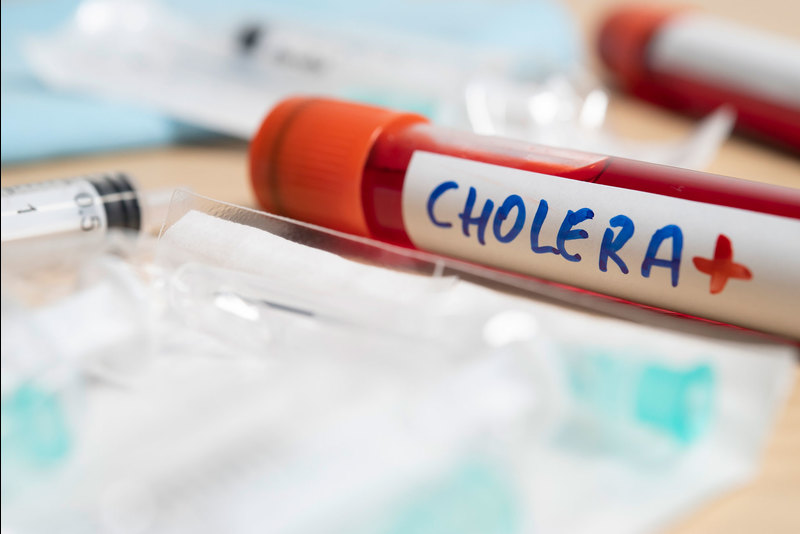Cholera: vaccines can stop the spread, but the biggest deterrent is clean water
05 July 2023 | Story Edina Amponsah-Dacosta and Julie Copelyn. Photo iStock. Read time 5 min.
South Africa has experienced outbreaks of cholera since January. The worst was in May in Hammanskraal, north of Pretoria, where nearly 30 people died. Cholera is a bacterial disease which spreads via the faecal-oral route mostly through ingestion of contaminated food and water. It causes severe diarrhoea and dehydration, and in extreme cases death. The source of the outbreak in Hammanskraal is still not known. The World Health Organization (WHO) recommendations for responding to a cholera outbreak include ensuring that communities have access to safe drinking water and sanitation, and treating sick people quickly. Oral cholera vaccines may be considered to contain ongoing outbreaks and to limit the spread. These vaccines have not been administered during the current outbreak in South Africa. The Conversation Africa spoke to University of Cape Town (UCT) vaccinologists Edina Amponsah-Dacosta and Julie Copelyn about the cholera vaccine and other ways to curb the outbreak.
Where do vaccines fit into the picture? How do they work?
Poor access to safe water and sanitation are the key driving factors behind cholera transmission. Ensuring access to clean potable water, adequate sanitation and promoting hygiene practices are critical to preventing the disease.
Vaccinations are a complementary prevention and control strategy. These are particularly useful in endemic areas, outbreaks and humanitarian crises.
The aim of vaccination is to prevent infection with the bacterium that causes cholera: Vibrio cholerae. Vaccination can also reduce the risk of severe illness that requires hospitalisation.
The first widely used cholera vaccines were injectable formulations. They were first developed in the late 19th and early 20th centuries. But they had side effects like headaches, malaise, nausea, fever and rash and offered only limited immune protection.
In the 1980s these vaccines were replaced by safer and more effective oral cholera vaccines.
The WHO has prequalified two types of oral cholera vaccines for commercial use globally. (This means it has assessed and assured their quality, safety and efficacy.) The prequalified vaccines consist of inactivated strains of V. cholerae only (Shanchol™ and Euvichol®); or in combination with a harmless form of the bacterial toxin (Dukoral®). Exposure to these inactivated or “killed” bacteria trigger the body to generate an immune response in the gut mucosa - the primary site of infection. This immune response is protective against future infection with the bacteria.
Studies have shown that oral cholera vaccines are effective at preventing disease in the person who is vaccinated. It can also confer indirect or herd protection by reducing the spread of V. cholerae within a highly vaccinated community.
New generation oral and injectable cholera vaccines are currently in development.
Who should be vaccinated and when?
The decision to vaccinate should be informed by your level of risk, and how frequent and widespread the outbreak is.
The best time to administer oral cholera vaccines is before a person is exposed to the bacteria.
The WHO recommends vaccination with oral cholera vaccines in areas where cholera occurs regularly and in areas where there could be large outbreaks or epidemics of cholera. This includes humanitarian crisis situations. In such settings, access to safe water supplies and adequate sanitation may be hampered. Widespread vaccination is required in these settings to interrupt further spread of cholera.
In countries where outbreaks aren’t frequent, such as South Africa, mass vaccination against cholera is not necessary. Vaccination is not a replacement for provision of safe drinking water, adequate sanitation and good hygiene practices.
Under the current circumstances in South Africa, vaccination should be limited to those at high risk: people in continuous direct contact with cholera patients, working with laboratory specimens, or frequently exposed to contaminated food and water.
After complete vaccination it takes the body seven to 10 days to produce protective antibodies. Scientific evidence on how long this protection lasts is still developing. Existing evidence suggests that immune protection from oral cholera vaccines could last for up to three years.
What else can be done to avoid cholera?
During sporadic cholera outbreak situations such as the current outbreak in South Africa, the priority should be early detection and appropriate management of people who have been infected. Water, sanitation and hygiene interventions must be implemented immediately in affected communities to interrupt further spread.
Such interventions include making safe drinking water accessible in instances where the water supply may be contaminated or unreliable, improving sanitation, and raising awareness about the importance of frequent hand-washing with soap and clean water. In addition, active disease surveillance must take place to monitor transmission patterns.
The current cholera outbreak in South Africa is a rude awakening. It suggests that the country may not have adequately applied the lessons learnt from previous outbreaks. The most recent major outbreak affected all nine provinces with 1144 laboratory-confirmed cases and 64 deaths recorded between November 2008 and April 2009.
This is a reminder of the inequities and gaps in social development, as well as the unacceptable state of the country’s wastewater treatment systems.
Ultimately, if effective control of cholera is to be achieved, local authorities must execute their responsibility of ensuring that all citizens have access to safe water supply and adequate sanitation.
In addition, supporting cholera control efforts in neighbouring countries will reduce the risk of importation. This will require prioritisation in the African public health agenda backed by intensified investments in water, sanitation and hygiene interventions and oral cholera vaccines.
Fortunately, the South African-based bio-pharmaceutical company Biovac recently secured the rights to manufacture oral cholera vaccines. This is a significant step in meeting the growing demand for the vaccine across the region.![]()
Edina Amponsah-Dacosta, Research Officer / EIDM Specialist, and Julie Copelyn, Senior lecturer, University of Cape Town.










